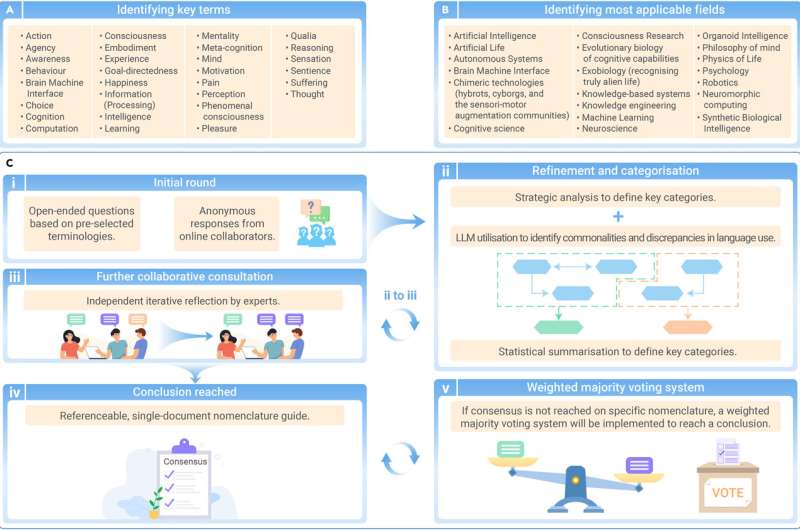
A call for collaboration to define the language in all AI related spaces, with a focus on 'diverse intelligent systems' that include AI (Artificial Intelligence), LLMs (Large Language Models) and biological intelligences is underway. The study was led by Cortical Labs—the biological computing startup that created "Dishbrain"—and brought together scientists, ethicists and researchers from the United Kingdoms, Canada, U.S., the EU, Australia and Singapore. Together they have proposed a pathway forward to unify the language in the rapidly growing and controversial area.
The research is published in The Innovation journal.
Whether progress is silicon-based, such as the use of large language models, or through synthetic biology methods such as the development of organoids, a clear need for a community-based approach to seeking consensus on nomenclature is now vital.
Commenting on the collaboration, Brett Kagan, Chief Scientific Officer at Cortical Labs, said, "We're extremely excited about collaborating with the industry on a study that is both timely and essential. Ultimately, the purpose of this collaboration is to create a critical field guide for researchers, across a broad range of fields, who are engaged in the development of diverse generally intelligent systems. In what is a rapidly evolving space, such a guide doesn't yet exist."
Other scientists involved in the effort, such as Professor Ge Wang from RPI, U.S. share similar excitement and said, "Currently, multimodal multitask foundation models are under rapid development via digital communication but this approach is subject to major limitations. In this big picture, our proposed efforts will be instrumental."
Toward a nomenclature consensus
Language used to describe specific phenomena for scientific and public discourse is complex and can be highly contentious for emerging science and technology. Rapidly growing fields aiming to create generally intelligent systems are controversial with disagreements, confusion, and ambiguity pervading discussions around the semantics used to describe this myriad of technologies.
Even 15 years ago, for example, at least 71 distinct definitions of "intelligence" had been identified. The diverse technologies and disciplines that contribute toward the shared goal of creating generally intelligent systems further amplify the disparate definitions used for any given concept. Today, it is increasingly impractical for researchers to explicitly re-define every term that could be considered ambiguous, imprecise, interchangeable or seldom formally defined in each paper.
A common language is needed to recognize, predict, manipulate, and build cognitive (or pseudo-cognitive) systems in unconventional embodiments that do not share straightforward aspects of structure or origin story with conventional natural species. Previous work proposing nomenclature guidelines are generally highly field specific and developed by selected experts, with little opportunity for broader community engagement.
It's for this reason that researchers and scientists in related fields are being invited to collaborate, broadly agree upon, and adopt nomenclature for this field. The purpose of the work is to provide utility and nuance to the discussion and offer authors an option to use language explicitly, unambiguously, and consistently, insofar as rapidly emerging fields will allow, through the adoption of nomenclature adhering to a theory-agnostic standard.
The collaboration will seek to define a non-exhaustive list of key terms. The study to establish nomenclature consensus will be most applicable to a number of specific fields including, but not limited to, artificial intelligence, autonomous systems, consciousness research, machine learning, organoid intelligence and robotics. However, other fields beyond those listed may also derive value from the approach towards consensus.
The collaboration will be carried out using a mixed method approach with a modified Delphi method. This approach entails an initial round with pre-selected open-ended questions, strategic refinement and categorization, and collaborative consultation in an iterative manner until a suitable level of consensus is achieved. If consensus is not reached on any specific terms, a weighted majority voting system will be implemented to reach a conclusion.
More information: Brett J. Kagan et al, Toward a nomenclature consensus for diverse intelligent systems: Call for collaboration, The Innovation (2024). DOI: 10.1016/j.xinn.2024.100658
Provided by Cortical Labs
Citation: Researchers collaborate to define language for diverse intelligent systems (2024, July 30) retrieved 30 July 2024 from https://techxplore.com/news/2024-07-collaborate-language-diverse-intelligent.html
This document is subject to copyright. Apart from any fair dealing for the purpose of private study or research, no part may be reproduced without the written permission. The content is provided for information purposes only.
